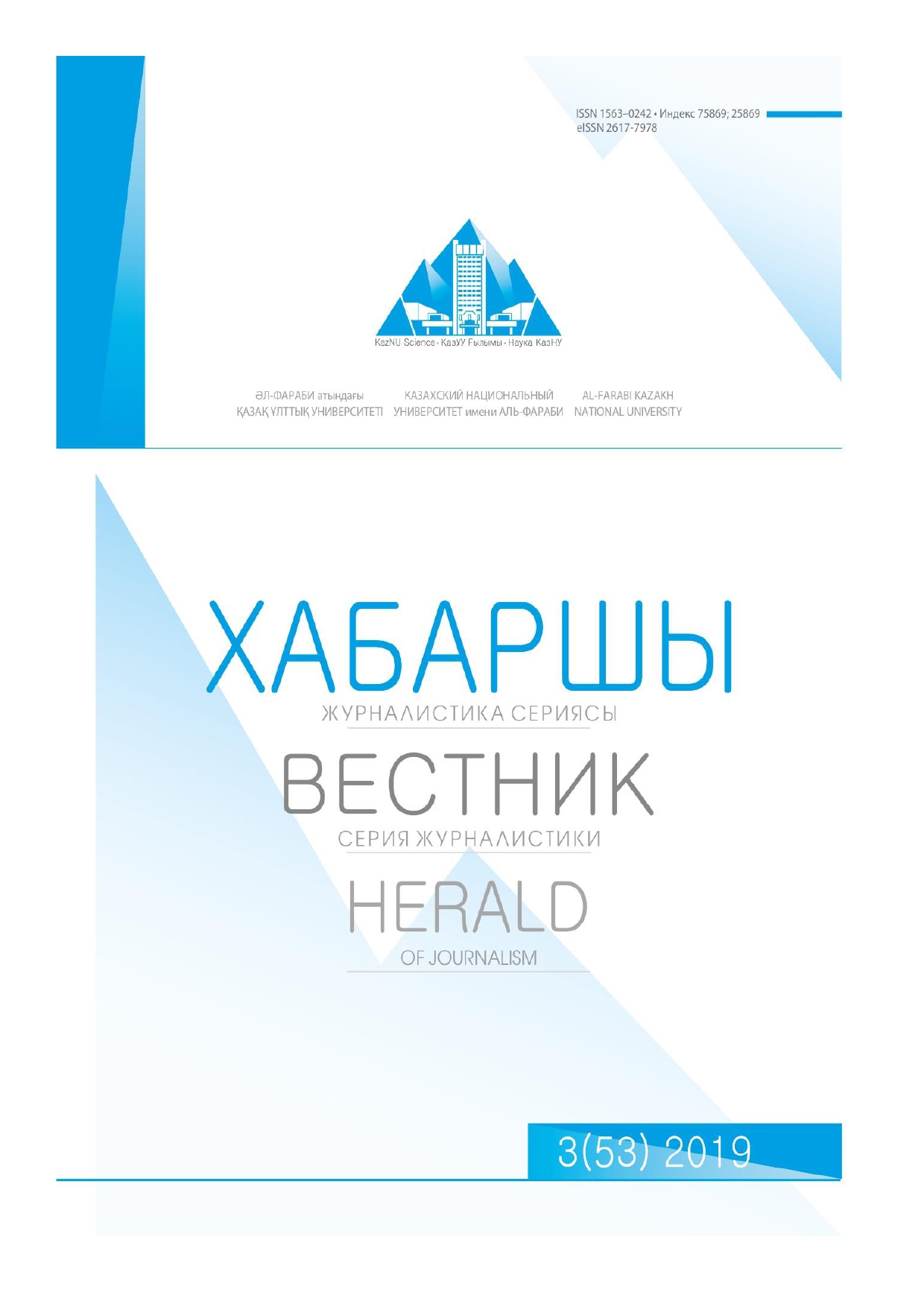How the journalism community in Kazakhstan views journalism education
DOI:
https://doi.org/10.26577/HJ.2019.v53.i3.010Кілттік сөздер:
journalism education, journalists, professionalism, students of journalism, Kazakhstan.Аннотация
The main objective of this study is to analyze journalism education in the context of the former Soviet Union Republic of Kazakhstan. Although many studies already exist globally about journalism education, Kazakhstan is one of the many developing countries that are largely absent from academic knowledge. Specifically, this study seeks to understand widely perceived outdated journalism educa- tion curriculum and its implications for the profession of journalism in this Central Asian country. The proposed broad research question: What substantive changes (if any) do journalism stakeholders see the need to insert in journalism programs in the country?
To answer this research question, authors conducted in-depth qualitative interviews with 24 work- ing journalists, editors and students of journalism across the country. The interviews were undertaken in February-May, 2019.
Some recent developments highlight the urgent need for such study. For example, there was a public call for closure of all journalism programs at universities in part because the Kazakhstan universities are said to be failing to prepare knowledgeable journalists who can shoot, edit and undertake journalistic tasks. Many local editors publicly describe college and university graduates as lacking skills to be able to work in journalism. The main problem of journalism is similar to the problems in the technology indus- try - it changes too quickly. In addition, universities are generally not well equipped with the necessary equipment, on which students could work or practice. The findings are discussed in relation to practical implications for journalism education in the context of Kazakhstan.
Библиографиялық сілтемелер
Center for International Media Assistance. (2018). Defending Independent Media: A Comprehensive Analysis of Aid Flows.
Retrieved from https://www.cima.ned.org/publication/comprehensive-analysis-media-aid-flows/
Center for International Media Assistance. (2007). University Journalism Education: A Global Challenge. Retrieved from https://www.cima.ned.org/wp-content/uploads/2015/02/CIMA-University_Journalism_Education-Report.pdf
Claussen, D. S. (2019). The best indicator of a journalism program’s graduates is who it admits. Newspaper Research Journal, 40(2), 131-135.
Freedman, E. (2007). After the Tulip Revolution: Journalism Education in Kyrgyzstan. Asia Pacific Media Educator, 18, 172-
184.
Freedman, E. & Shafer, R. (2012). Advancing a Comprehensive Research Agenda for Central Asian Mass Media. Media Asia,
39(3): 119-126.
International Research and Exchanges Board. (2019). Media Sustainability Index: Development of Sustainable Independent Media in Europe and Eurasia. Washington, DC: IREX.
Josephi, B. (2004). Desired attributes for young journalists. Asia Pacific Media Educator, 15, 99-114.
Kenny, T. & Gross, P. (2008). Journalism in Central Asia: A Victim of Politics, Economics, and Widespread Self-Censorship.
The International Journal of Press/Politics, 13(4), 515-525.
Lukina, M.; &Vartanova, E. (2017). Journalism Education in Russia: How the Academy and Media Collide, Cooperate, and Coexist (pp. 155-174). In. R. S. Goodman & E. Steyn (Eds.). Global Journalism Education in the 21st Century: Challenges and In- novations. Austin, TX: University of Texas Knight Center for Journalism in the Americas.
Mould, D. & Schuster, E. (1999). Central Asia: Ethics—a Western luxury. In M. Kunczik (Ed.), Ethics in Journalism: A Reader on Their Perception in the Third World. Bonn: Friedrich-Ebert-Stiftung.
Nemecek, M.; Ketterer, S., Ibrayeva, G., & Los, S. (2011). Journalism Education and Professional Training in Kazakhstan: From the Soviet Era to Independence. In E Freedman & R. Shafer (Eds), After the Czars and Commissars: Journalism in Authoritarian Post-Soviet Central Asia ((pp. 217-232). East Lansing, MI: Michigan State University Press
Skochilo, E.; Toralieva, G.; Freedman, E. & Shafer, R. (2013). Transplanting a Western-style Journalism Education to the Central Asian Republics of the Former Soviet Union: Experiences and Challenges at the American University of Central Asia in Kyrgyzstan. Journalism & Mass Communication Educator, 68(4), 409-420.
Toralieva, G. (2014). Kyrgyzstan-Challenges for Environmental Journalism. In Y. Kalyango& D. Mould (Eds.), Global Journal- ism Practice and New Media Performance (pp. 214-226). Palgrave Macmillan.
Electronic resources:
Today.kz. (July 4, 2019). 180 kollejei I 20 peredovyhvuzovbudutsozdany v Kazahstane [180 colleges and 20 advanced universi- ties will be created in Kazakhstan]. Retrieved on July 23, 2019, from http://today.kz/news/kazahstan/2019-07-04/779908-kolledzhej- i-20-peredovyih-vuzov-budut-sozdanyi-v-kazahstane/




